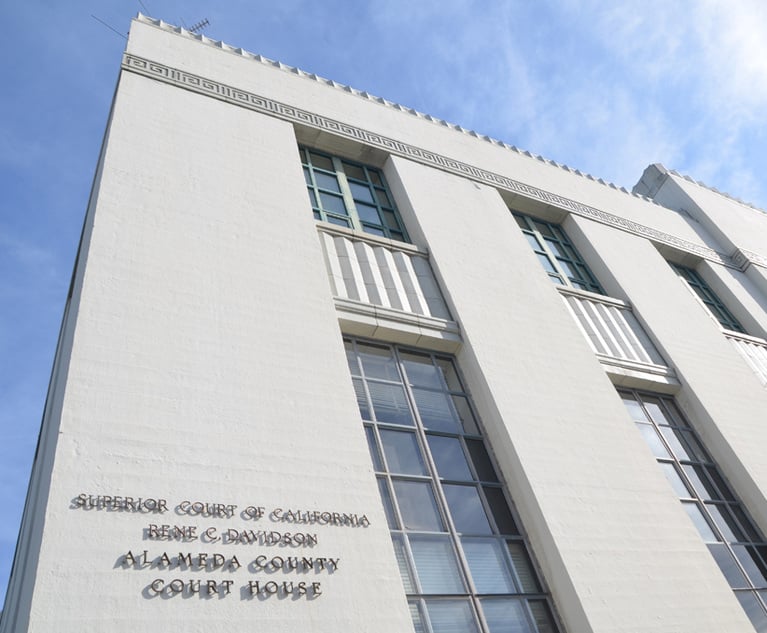Jailhouse Informant Law Has No Tracking
Bruce Gerstman and Daniel HorowitzWhen Charles Waldo went to trial in Contra Costa County in March facing fraud and embezzlement charges, prosecutors…
October 06, 2017 at 04:26 PM
4 minute read
 Bruce Gerstman and Daniel Horowitz
Bruce Gerstman and Daniel HorowitzWhen Charles Waldo went to trial in Contra Costa County in March facing fraud and embezzlement charges, prosecutors added a twist.
Three jailhouse informants came forward at the last minute to say Waldo solicited them to coordinate the murders of three witnesses.
Waldo and his attorney, Chris Martin, scrambled to make sense of these witnesses. It turned out that they were “professional snitches” and had acted as informants in previous cases. The prosecution gave scant information about the informants to the defense team, who were fortunate to learn about them on their own. Martin said he learned that law enforcement had threatened one with prosecution if he did not testify against Waldo. The other was granted probation on a separate case in exchange for testimony.
Ultimately, the jury convicted Waldo on various fraud charges, but didn't believe the informants and acquitted him of the soliciting murder charge.
Waldo's case is an example of why California Assembly Member Reginald Byron Jones-Sawyer introduced the In-Custody Informants Bill, AB 359, which if passed will require state prosecutors to provide within 30 days of trial a full history of instances when police and prosecutors have made any kind of agreement with an inmate to testify. It will also require counties to maintain searchable databases of informants so the defense can identify inmates who have benefitted in the past from being an informant.
A professional snitch often gets money and a “Get Out of Jail Free” card in exchange for information or testimony implicating someone else. When released, the person often continues to commit crimes, knowing that if caught, he can buy his way out of trouble with information. On the streets and in the jails, these professional snitches gather and store information for another time. If times are tough and information is missing, they will often invent it.
But the databases cover only local informants. Defense attorneys still won't have the ability to search whether an informant testified in other jurisdictions. According to the counsel for the Assembly Committee on Public Safety, once the law is implemented, prosecutors will enter information about the informant into a county database that will be disconnected from other counties. A defense attorney will see instances when an informant cooperated with law enforcement in, for instance, Contra Costa County, but not whether the same witness got a deal nearby in San Francisco County, or further away in Los Angeles County.
The database also will not cover information provided “on the street” in exchange for police officers or prosecutors declining to make arrests or file charges.
Unfortunately, this leaves out a systematic approach to the problem and even the most well-intentioned prosecutors will not be able to provide all of the background information about an informant because nobody will have a window into the statewide records.
The bill mandates district attorney offices to begin entering informant data starting when the law goes into effect, so prior instances of informants working with law enforcement will not be included, according to the public safety committee counsel.
With all of this in mind, Jones-Sawyer's bill will help track criminals charged with breaking laws in a specific county, but not when the same criminals have moved throughout California.
Bruce Gerstman founded Waterfront Intelligence after nine years of conducting nearly every kind of investigation as an investigator with global consulting firm Kroll Associates. He previously conducted investigations as a newspaper reporter, covering legal affairs, crime, and the courts for The Contra Costa Times. http://waterfrontintelligence.com/
Daniel A. Horowitz is an American defense attorney who has represented several high-profile clients and is a frequent commentator in the media on criminal cases in the news. He is based in the SF Bay Area. www.whitecollar.us
This content has been archived. It is available through our partners, LexisNexis® and Bloomberg Law.
To view this content, please continue to their sites.
Not a Lexis Subscriber?
Subscribe Now
Not a Bloomberg Law Subscriber?
Subscribe Now
NOT FOR REPRINT
© 2025 ALM Global, LLC, All Rights Reserved. Request academic re-use from www.copyright.com. All other uses, submit a request to [email protected]. For more information visit Asset & Logo Licensing.
You Might Like
View All
Two More Victims Alleged in New Sean Combs Sex Trafficking Indictment


'It's a Matter of Life and Death:' Ailing Harvey Weinstein Urges Judge to Move Up Retrial

Invoking Trump, AG Bonta Reminds Lawyers of Duties to Noncitizens in Plea Dealing
4 minute readTrending Stories
- 1Parties’ Reservation of Rights Defeats Attempt to Enforce Settlement in Principle
- 2ACC CLO Survey Waves Warning Flags for Boards
- 3States Accuse Trump of Thwarting Court's Funding Restoration Order
- 4Microsoft Becomes Latest Tech Company to Face Claims of Stealing Marketing Commissions From Influencers
- 5Coral Gables Attorney Busted for Stalking Lawyer
Who Got The Work
J. Brugh Lower of Gibbons has entered an appearance for industrial equipment supplier Devco Corporation in a pending trademark infringement lawsuit. The suit, accusing the defendant of selling knock-off Graco products, was filed Dec. 18 in New Jersey District Court by Rivkin Radler on behalf of Graco Inc. and Graco Minnesota. The case, assigned to U.S. District Judge Zahid N. Quraishi, is 3:24-cv-11294, Graco Inc. et al v. Devco Corporation.
Who Got The Work
Rebecca Maller-Stein and Kent A. Yalowitz of Arnold & Porter Kaye Scholer have entered their appearances for Hanaco Venture Capital and its executives, Lior Prosor and David Frankel, in a pending securities lawsuit. The action, filed on Dec. 24 in New York Southern District Court by Zell, Aron & Co. on behalf of Goldeneye Advisors, accuses the defendants of negligently and fraudulently managing the plaintiff's $1 million investment. The case, assigned to U.S. District Judge Vernon S. Broderick, is 1:24-cv-09918, Goldeneye Advisors, LLC v. Hanaco Venture Capital, Ltd. et al.
Who Got The Work
Attorneys from A&O Shearman has stepped in as defense counsel for Toronto-Dominion Bank and other defendants in a pending securities class action. The suit, filed Dec. 11 in New York Southern District Court by Bleichmar Fonti & Auld, accuses the defendants of concealing the bank's 'pervasive' deficiencies in regards to its compliance with the Bank Secrecy Act and the quality of its anti-money laundering controls. The case, assigned to U.S. District Judge Arun Subramanian, is 1:24-cv-09445, Gonzalez v. The Toronto-Dominion Bank et al.
Who Got The Work
Crown Castle International, a Pennsylvania company providing shared communications infrastructure, has turned to Luke D. Wolf of Gordon Rees Scully Mansukhani to fend off a pending breach-of-contract lawsuit. The court action, filed Nov. 25 in Michigan Eastern District Court by Hooper Hathaway PC on behalf of The Town Residences LLC, accuses Crown Castle of failing to transfer approximately $30,000 in utility payments from T-Mobile in breach of a roof-top lease and assignment agreement. The case, assigned to U.S. District Judge Susan K. Declercq, is 2:24-cv-13131, The Town Residences LLC v. T-Mobile US, Inc. et al.
Who Got The Work
Wilfred P. Coronato and Daniel M. Schwartz of McCarter & English have stepped in as defense counsel to Electrolux Home Products Inc. in a pending product liability lawsuit. The court action, filed Nov. 26 in New York Eastern District Court by Poulos Lopiccolo PC and Nagel Rice LLP on behalf of David Stern, alleges that the defendant's refrigerators’ drawers and shelving repeatedly break and fall apart within months after purchase. The case, assigned to U.S. District Judge Joan M. Azrack, is 2:24-cv-08204, Stern v. Electrolux Home Products, Inc.
Featured Firms
Law Offices of Gary Martin Hays & Associates, P.C.
(470) 294-1674
Law Offices of Mark E. Salomone
(857) 444-6468
Smith & Hassler
(713) 739-1250






